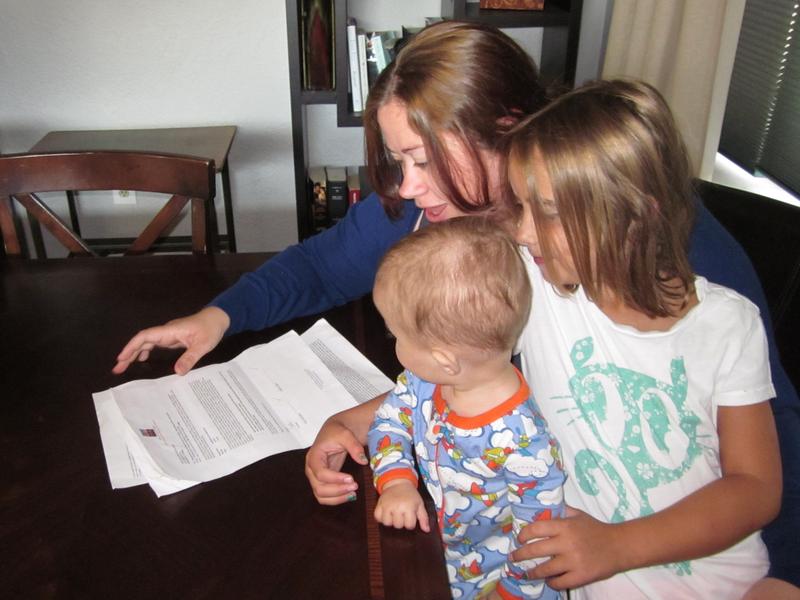 All Things Considered
All Things Considered
Residents Worry Urban Drilling Will Turn Downtowns Into Oil Towns

Dawn Gioia lives just two blocks away from City Hall in Brighton, Colo., just north of Denver. She never expected to receive a thick envelope from Mid-Con Energy in the mail, proposing she sell mineral rights for oil and gas drilling.
At first, she thought it was a scam.
"One of these forms asks you for all your tax information and Social Security numbers, so that was something that sort of caught me off guard," she says.
The packet also included a lease for her mineral rights. The terms include a $1,200 signing bonus for every acre owned, and 18 percent after that.
As she read it over, Gioia realized, she says, "They actually think they want to drill here, under our property."
The energy extraction method known as fracking is moving into midsize cities — and not just on the fringes. Drilling for oil and gas isn't new in rural or even suburban areas, but as extraction companies move into cities, it's raising a new set of concerns.
Gioia says her neighbors were also surprised to receive similar offers from Mid-Con Energy — including her mother-in-law, who owns a townhome a few miles away.
They didn't quite know what to make of the letters. "I don't know — do they own the land?" Gioia says. Her mother-in-law was "really confused," she says, and Gioia was, too.
Gioia called the energy company to learn more. The man she reached, she says, reminded her of a sleazy car salesman. "He was pretty much just like, 'Sign it, sign it, sign it.' "
His pushy tone inspired her to call a lawyer and organize a neighborhood meeting.
"There's all kinds of questions that come up, of how does this work? Is there going to be like, trucks driving through our neighborhood every day? What happens to the property values? I did have one neighbor say, 'Should I sell before they start this?' "
With her small plot, Gioia says, she doesn't think she'd make much money by leasing. In the best-case scenario, she says, the profits could be about $200 a month.
Mid-Con Energy declined to be interviewed for this story, saying only that it would be premature to discuss development plans before reaching an agreement with a mineral owner.
Residents in the nearby city of Greeley, with a population of about 100,000, are fighting proposals to expand drilling there. Sara Barwinski lives about 750 feet from an active drill pad.
"That site is also adjacent to a high school, 411 feet from a track-and-field [location] in a high-density residential area," Barwinski says.
She then clenches her hands as she describes a proposal to drill multiple wells near an elementary school. "Why should we be preparing evacuation plans for a kindergartner?"
Barwinski worries about an accident in a dense urban core. It would be difficult to evacuate hospital patients or retirement home residents, she says.
But Barbara Kirkmeyer, a local county commissioner, argues that state regulations are strong enough to prevent accidents. Plus, she says, drilling is good for the economy.
"The businesses that are in town all seem to be booming. I mean, if you walk along Main Street here, it's just bustling."
Kirkmeyer also says the dollars extend beyond city limits. "We're all going to figure out how we're going to coexist, because it's extremely important to our economy. And it's not just our economy here in Weld County — it's our economy in the state of Colorado."
Urban drilling is also happening in midsize cities in other parts of the country, like North Texas and Southern California. Drilling is also up in larger cities like Los Angeles. The majority of production there, however, is not close to downtown.
Back in Brighton, Dawn Gioia and her husband are weighing the pros and cons of signing a lease. She predicts her household will probably be the last on her block to decide whether to sign over their mineral rights.
She's not against fracking; she says she recognizes the importance of oil and gas. But she worries about potential spills, because Brighton's municipal water comes from shallow aquifers.
Mostly, she's concerned about the future.
"I don't want to become an oil town. When the oil leaves or when it dries up, what will happen to Brighton when it's gone?" she says. "I know they say, 'Hey, it's good for the economy. You're going to bring all these workers, and everyone's going to get work.' But when it's dried up, then what happens?"
9(MDEwODYxNTQyMDEzNjAxODk2Nzc2NzNmYQ001))